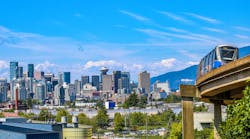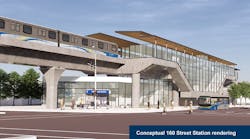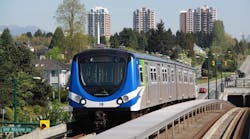TransLink 2022 Investment Plan approved; BC government commits C$2.4 billion to agency
Late last week, the Mayors’ Council on Regional Transportation and TransLink’s Board of Directors approved the agency’s 2022 Investment Plan followed by the government of British Columbia committing C$2.4 billion (US$1.89 billion) to support transit investments.
“After a very difficult two years, I’m proud that this Investment Plan is affordable and realistic and will bring us closer to creating a more sustainable and livable region. This plan will stabilize transit funding, advance key priorities and set up this region for decades of transportation improvements,” said Mayors’ Council Chair Jonathan Coté. “We are grateful for the province’s continued support for better public transit and sustainable communities across Metro Vancouver.”
The 2022 Investment Plan recognizes the challenges brought about by the COVID-19 pandemic. While ridership has returned to 70 percent of pre-pandemic levels, fare revenues continue to be reduced. TransLink says prior pandemic relief funding from the governments of Canada and British Columbia of C$176 million (US$138.9 million), along with Safe Restart funding of C$675.8 million (US$533.3 million), is helping vital transit services remain at or near pre-pandemic levels. The approved investment plan is focused on stabilizing funding during the next three years through a series of steps designed to deliver cost savings while maintaining service.
These funding stabilization measures include:
- Maintaining current bus service levels until the next Investment Plan update.
- Cost-saving measures, including savings from increased bus priority investments.
- Continuing with annual fare increases of 2.3 percent until 2024.
- This is lower than planned in previous investment plans to keep costs low while helping to fund rising costs of transit operations.
- Additional annual increases to standard property tax revenues of 1.15 percent – which is equal to approximately C$3 for an average residential property next year.
- Additional revenues derived from expanded commercial, real estate development and advertising opportunities.
- Additional carbon credit revenues from the Low Carbon Fleet Strategy.
“Investing in transit improvements is critical for the future of this region. This plan will stabilize our funding to put us in a better position to bring historic transit expansions through Transport 2050: 10-Year Priorities. In the short-term, this plan will also achieve key regional priorities like reducing carbon emissions, upgrading customer amenities and building critical transportation infrastructure,” said TransLink CEO Kevin Quinn.
The 2022 Investment Plan’s executive summary lays out the regions ambitions to deliver convenient options for residents to “get around reliably, affordably, safelyy and comfortably and in ways that are carbon-free.” The capital investments included in the plan supports this vision.
The priority projects included in the plan are:
- The Surrey Langley SkyTrain project.
- Adding approximately 500 new battery-electric buses.
- Opening public washrooms at six major transit hubs beginning in 2024.
- Implementing the R6 RapidBus in Surrey and Delta, and early work on a new R7 RapidBus route, connecting the Canada Line from Richmond to the Expo Line.
- Increasing HandyDART service by three percent.
- Advancing planning of transit service to Indigenous communities.
- Upgrading the Compass payment system to improve the customer experience.
- Improving and maintaining regional roads, walkways and cycling paths.
Provincial investment
The government of British Columbia’s C$2.4 billion (US$1.89 billion) investment is part of its ongoing commitment to fund 40 percent of the Mayors’ Council 10-Year Vision. The province also notes the 2022 Investment Plan supports the province’s climate-change and clean-economy objectives through the CleanBC Roadmap to 2030. For example, the electric bus and renewable natural gas bus purchases included in the plan will replace more than one third of TransLink’s diesel fleet.
“We’re making investments to support a better future for people throughout Metro Vancouver with more affordable and convenient travel options, cleaner air and less climate pollution,” said George Heyman, Minister of Environment and Climate Change Strategy and Minister Responsible for TransLink. “By supporting TransLink to help provide public transit options that connect us to our communities, workplaces, friends and families, we’re building more vibrant communities with easier access to jobs, housing, recreation and services people depend on.”
Surrey, B.C., Mayor Doug McCallum applauded the provincial government’s decision to provide funding toward the plan and explains the improvements included in the 2022 Investment Plan “will have a significant impact in Surrey.”
One of the major projects to advance in the plan is the 16-km (9.9-mile) Surrey Langley SkyTrain, which will extend the Expo Line to Langley and supports future growth in the South of Fraser.
“With more and more people moving to Surrey and working within city limits, the Surrey Langley SkyTrain will have no shortage of riders when it goes into service in 2028. With 39 percent of emissions coming from gas cars in Surrey, this transportation megaproject will make it easier for our residents to choose fast, convenient and reliable transit over costly gas vehicles. I want to thank the BC government for [its] continued support of smart transit choices that will result in cleaner and healthier communities in Surrey,” said Mayor McCallum.

Mischa Wanek-Libman | Group Editorial Director
Mischa Wanek-Libman is director of communications with Transdev North America. She has more than 20 years of experience working in the transportation industry covering construction projects, engineering challenges, transit and rail operations and best practices.
Wanek-Libman has held top editorial positions at freight rail and public transportation business-to-business publications including as editor-in-chief and editorial director of Mass Transit from 2018-2024. She has been recognized for editorial excellence through her individual work, as well as for collaborative content.
She is an active member of the American Public Transportation Association's Marketing and Communications Committee and served 14 years as a Board Observer on the National Railroad Construction and Maintenance Association (NRC) Board of Directors.
She is a graduate of Drake University in Des Moines, Iowa, where she earned a Bachelor of Arts degree in Journalism and Mass Communication.






